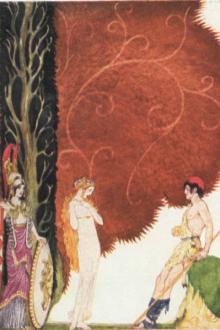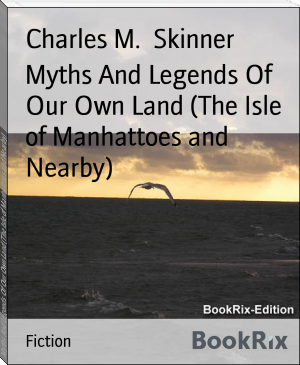The Adventures of Odysseus and The Tales of Troy - Padraic Colum (i read books .txt) 📗

- Author: Padraic Colum
- Performer: -
Book online «The Adventures of Odysseus and The Tales of Troy - Padraic Colum (i read books .txt) 📗». Author Padraic Colum
'And another image he made of a vineyard, with clusters of grapes that showed black, and with the vines hanging from silver poles. And he showed maidens and youths in the vineyard, gathering the grapes into baskets, and one amongst them, a boy, who played on the viol. Beside the image of the vineyard he made images of cattle, with herdsmen, and with nine dogs guarding them. But he showed two lions that had come up and had seized the bull of the herd, and the dogs and men strove to drive them away but were affrighted. And beside the image of the oxen he made the image of a pasture land, with sheep in it, and sheepfolds and roofed huts.'
'He made yet another picture—a dancing-place with youths and maidens dancing, their hands upon each others' hands. Beautiful dresses and wreaths of flowers the maidens had on, and the youths had daggers of gold hanging from their silver belts. A great company stood around those who were dancing, and amongst them there was a minstrel who played on the lyre.'
'Then all around the rim of the shield Hephaistos, the lame god, set an image of Ocean, whose stream goes round the world. Not long was he in making the shield and the other wonderful pieces of armour. As soon as the armour was ready Thetis put her hands upon it, and flying down from Olympus like a hawk, brought it to the feet of Achilles, her son.'
'And Achilles, when he saw the splendid armour that Hephaistos the lame god had made for him, rose up from where he lay and took the wonderfully-wrought piece in his hands. And he began to put the armour upon him, and none of the Myrmidons who were around could bear to look upon it, because it shone with such brightness and because it had all the marks of being the work of a god.'
XVIIhen Achilles put his shining armour upon him and it fitted him as though it were wings; he put the wonderful shield before him and he took in his hands the great spear that Cheiron the Centaur had given to Peleus his father—that spear that no one else but Achilles could wield. He bade his charioteer harness the immortal horses Xanthos and Balios. Then as he mounted his chariot Achilles spoke to the horses. "Xanthos and Balios," he said, "this time bring the hero that goes with you back safely to the ships, and do not leave him dead on the plain as ye left the hero Patroklos."'
'Then Xanthos the immortal steed spoke, answering for himself and his comrade. "Achilles," he said, with his head bowed and his mane touching the ground, "Achilles, for this time we will bring thee safely back from the battle. But a day will come when we shall not bring thee back, when thou too shalt lie with the dead before the walls of Troy."'
'Then was Achilles troubled and he said, "Xanthos, my steed, why dost thou remind me by thy prophecies of what I know already—that my death too is appointed, and that I am to perish here, far from my father and my mother and my own land."'
'Then he drove his immortal horses into the battle. The Trojans were affrighted when they saw Achilles himself in the fight, blazing in the armour that Hephaistos had made for him. They went backward before his onset. And Achilles shouted to the captains of the Greeks, "No longer stand apart from the men of Troy, but go with me into the battle and let each man throw his whole soul into the fight."'
'And on the Trojan side Hector cried to his captains and said, "Do not let Achilles drive you before him. Even though his hands are as irresistible as fire and his fierceness as terrible as flashing steel, I shall go against him and face him with my spear."'
'But Achilles went on, and captain after captain of the Trojans went down before him. Now amongst the warriors whom he caught sight of in the fight was Polydoros, the brother of Hector and the youngest of all King Priam's sons. Priam forbade him ever to go into the battle because he loved him as he would love a little child. But Polydoros had gone in this day, trusting to his fleetness of foot to escape with his life. Achilles saw him and pursued him and slew him with the spear. Hector saw the death of his brother. Then he could no longer endure to stand aside to order the battle. He came straight up to where Achilles was brandishing his great spear. And when Achilles saw Hector before him he cried out, "Here is the man who most deeply wounded my soul, who slew my dear friend Patroklos. Now shall we two fight each other and Patroklos shall be avenged by me." And he shouted to Hector, "Now Hector, the day of thy triumph and the day of thy life is at its end."'
'But Hector answered him without fear, "Not with words, Achilles, can you affright me. Yet I know that thou art a man of might and a stronger man than I. But the fight between us depends upon the will of the gods. I shall do my best against thee, and my spear before this has been found to have a dangerous edge."'
'He spoke and lifted up his spear and flung it at Achilles. Then the breath of a god turned Hector's spear aside, for it was not appointed that either he or Achilles should be then slain. Achilles darted at Hector to slay him with his spear. But a god hid Hector from Achilles in a thick mist.'
'Then in a rage Achilles drove his chariot into the ranks of the war and many great captains he slew. He came to Skamandros, the river that flows across the plain before the city of Troy. And so many men did he slay in it that the river rose in anger against him for choking its waters with the bodies of men.'
'Then on towards the City, he went like a fire raging through a glen that had been parched with heat. Now on a tower of the walls of Troy, Priam the old King stood, and he saw the Trojans coming in a rout towards the City, and he saw Achilles in his armour blazing like a star—like that star that is seen at harvest time and is called Orion's Dog; the star that is the brightest of all stars, but yet is a sign of evil. And the old man Priam sorrowed greatly as he stood upon the tower and watched Achilles, because he knew in his heart whom this man would slay—Hector, his son, the protector of his City.'
XVIIIo much of the story of Achilles did Telemachus, the son of Odysseus, hear from the lips of King Menelaus as he sat with his comrade Peisistratus in the King's feasting-hall. And more would Menelaus have told them then if Helen, his wife, had not been seen to weep. 'Why weepst thou, Helen?' said Menelaus. 'Ah, surely I know. It is because the words that tell of the death of Hector are sorrowful to thee.'
And Helen, the lovely lady, said 'Never did Prince Hector speak a hard or a harsh word to me in all the years I was in his father's house. And if anyone upbraided me he would come and speak gentle words to me. Ah, greatly did I lament for the death of noble Hector! After his wife and his mother I wept the most for him. And when one speaks of his slaying I cannot help but weep.'
Said Menelaus, 'Relieve your heart of its sorrow, Helen, by praising Hector to this youth and by telling your memories of him.'
'To-morrow I shall do so,' said the lady Helen. She went with her maids from the hall and the servants took Telemachus and Peisistratus to their sleeping places.
The next day they sat in the banqueting hall; King Menelaus and Telemachus and Peisistratus, and the lady Helen came amongst them. Her handmaidens brought into the hall her silver work-basket that had wheels beneath it with rims of gold, and her golden distaff that, with the basket, had been presents from the wife of the King of Egypt. And Helen sat in her chair and took the distaff in her hands and worked on the violet-coloured wool that was in her basket. And as she worked she told Telemachus of Troy and of its guardian, Hector.
aid Helen, 'The old men were at the gate of the City talking over many things, and King Priam was amongst them. It was in the days when Achilles first quarrelled with King Agamemnon. "Come hither, my daughter," said King Priam to me, "and sit by me and tell me who the warriors are who now come out upon the plain. You have seen them all before, and I would have you tell me who such and such a one is. Who is yon hero who seems so mighty? I have seen men who were more tall than he by a head, but I have never seen a man who looked more royal."'
'I said to King Priam. "The hero whom you look upon is the leader of the host of the Greeks. He is the renowned King Agamemnon."'
'"He looks indeed a King," said Priam. "Tell me now who the other warrior is who is shorter by a head than King Agamemnon, but who is broader of chest and shoulder."'
'"He is Odysseus," I said, "who was reared in rugged Ithaka, but who is wise above all the Kings."'
'And an old man, Antenor, who was by us said, "That indeed is Odysseus. I remember that he and Menelaus came on an embassy to the assembly of the Trojans. When they both stood up, Menelaus seemed the greater man, but when they sat down Odysseus seemed by far the most stately. When they spoke in the assembly, Menelaus was ready and skilful of speech. Odysseus when he spoke held his staff stiffly in his hands and fixed his eyes on the ground. We thought by the look of him then that he was a man of no understanding. But when he began to speak we saw that no one could match Odysseus—his words came like snow-flakes in winter and his voice was very resonant."'
'And Priam said, "Who is that huge warrior? I think he is taller and broader than any of the rest."'
'"He is great Aias," I said, "who is as a bulwark for the Greeks. And beside him stands Idomeneus, who has come from the Island of Crete. Around him stand the Cretan captains." So I spoke, but my heart was searching for a sight of my own two brothers. I did not see them in any of the companies. Had they come with the host, I wondered, and were they ashamed to be seen with the warriors on account of my wrong-doing? I wondered as I looked for them. Ah, I did not know that even





Comments (0)